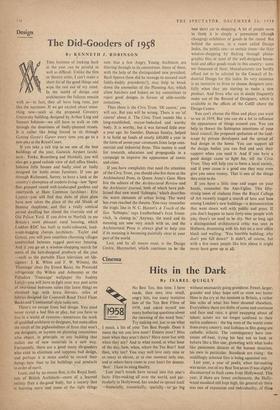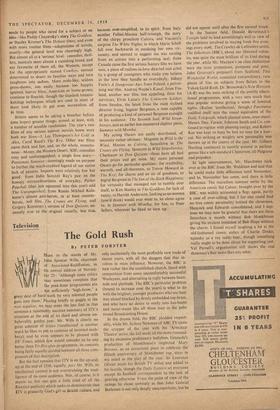Cinema
Hits in the Dark
By ISABEL QUIGLY No Best Ten, this time. I have made, then torn into small, angry bits, too many tentative lists of the Ten Best Films of 1958, and asked myself too many bothering questions about the meaning of the word 'best.' Try making out, just to see what I mean, a list of your Ten Best People. Does it mean the ten you love most? Esteem most? Miss most when they aren't there? Have most fun with when they are? And in what mood, at what hour of the day, how, when, where the Ten Best? And then, why ten? You may well love only nine or as many as eleven, or at one moment only one, and at others have room in your heart for dozens. `Best' : I hate its smug finality.
Last year's trends have turned into this year's facts. Film-making all over the world, and par- ticularly in Hollywood, has tended to spread itself —financially, numerically, spatially—to—go big without necessarily going grandiose. Fewer, larger, grander and (they hope and so must we) better films is the cry at the moment in Britain, a rather late echo of what has been shouted elsewhere. Everywhere there are shifts of scene and continent and face and race, a great swapping about of talent; actors are no longer confined to their native audiences : the big stars of the world come from every country, and fashions in film-going are catholic, eclectic. The contemporary hero con- tinues off-beat, trying his best not to look or behave like a film star, glowering with what looks like passionate distaste at the human situation, his own in particular. Standards are rising : the middlingly talented film is being squeezed out.
Last year, a year of peaks, when list-making was easier, out of my Best Ten seven (I was slightly disconcerted to find) came from Hollywood. This year, if there are fewer excitements, the Holly- wood standard still kept high, the general air there was one of expansion and individuality, of films made by people who cared for a subject or an idea—like Paddy Chayevsky's story The Goddess, or Stanley Kramer's The Defiant Ones; and even with more routine films—adaptations of novels, mostly—the general level was cheeringly high. But almost all at a `serious' level : comedies, thril- lers, musicals seem almost a vanishing breed, and my favourite of them all, the Western, except for the appropriately named Cowboy, seemed determined to desert its familiar ways and turn toughness into sadism. More mole-like, seldom press-shown, too easily because too happily ignored, horror films, American or home-grown, continue to flourish, though the slapdash tomato- ketchup techniques which are used in most of them look likely to put even werewolves off in time.
Britain seems to be taking a breather before (one hopes) greater things; armed, at least, with a number of sensible resolutions. The year's two films of any serious interest outside home were both war films—J. Lee Thompson's Ice Cold in Alex, Carol Reed's The Key. Other war films came thick and fast, and, on the whole, monoto- nous—Monty, the Western Desert, SOE; comedies cosy and undistinguished; a single love story— Passionate Summer—seemingly made on purpose to further the much-credited legend of our native lack of passion. Imports were relatively few but good : from India Sanyajit Ray's pair on the homely extraordinariness of everyday, Pather Pam half (that just squeezed into this year) and The Unvanquished; from Russia Mikhail Kala- tozov's almost anti-heroic, or at least counter- heroic, way film, The Cranes are Flying, and Grigory Kozintsev's version of Don Quixote, un- cannily true to the original visually, less true, because over-simplified, to its spirit; from Italy ' another Fellini-Masina half-triumph, the story of the chirpy prostitute Cabiria, and Visconti's surprise The White Nights, in which Maria Schell fell over backwards in outdoing her own vir- tuosity, and seemed to suggest she was turning from an actress into a performing seal; from Canada came the first serious feature film we have seen, a piece of realism-in-love directed and acted by a group of youngsters who make you believe in the love they handle so everydayly, Sidney Furie's A Dangerous Age; from Poland, a pulver- ising war film, Andrzej Wajda's Kanal; from Fin- land, another war film, less appalling, fitter for survivors, Elvin Laine's The Unknown Soldier; from Sweden, the latest from the most stylised director living, Ingmar Bergman, a man capable of producing a kind of personal Bergman eyesight in his audience: The Seventh Seal, Wild Straw- berries, and an earlier less mannered slighter piece, Summer with Monika.
My acting Oscars are easily distributed, of necessity rather obvious: Magnani in Wild is the Wind, Masina as Cabiria, Samoilova in The Cranes are Flying, Sjostrom in Wild Strawberries, Cherkasov as Don Quixote—these have all had their prizes and get mine. My more personal Oscars go for particular qualities: for credibility, warmth, and all-thereness, to Trevor Howard in The Key; for charm and an air of goodness, to Ingrid Bergman in The Inn of the Sixth Happiness; for virtuosity that managed not to tumble over itself, to Kim Stanley in The Goddess; for lack of vanity, to Harriet Andersson, looking as no woman (you'd think) would ever want to, let alone agree to, in Summer with Monika; for fun, to Peter Sellers, wherever he liked to turn up.



























 Previous page
Previous page